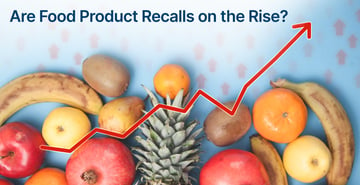Supply chain resilience, competition, routes to market, consumer base, and labor contribute to the impact of consumer product trends in the food industry.
Since the onset of the COVID-19 pandemic, the consumer product industry has faced its share of struggles – supply chain disruptions, global lockdowns, labor shortages, a rise in eCommerce, and an increasingly conscious consumer base, among others.
In the last two and a half years, industries have adapted and responded to disruptions to meet the needs of their consumers. However, it’s time for CPG companies – particularly those in the food industry – to be more proactive in anticipating and meeting consumers' everchanging needs and expectations.
Below we highlight five trends in the consumer products industry and how our solutions can help CPG businesses.
Supply Chain Resilience
The consumer product industry faces global supply chain disruptions, posing a threat to supply chain visibility and resiliency. Due to inflation and sustainability concerns, many CPG companies must revisit their product portfolios, frantically responding to disruptions instead of proactively preparing for them. Future supply chain disruptions are inevitable, so seeking out ways to establish a more resilient supply chain and prepare for future disruptions is essential.
With the right tools and resources, companies can find ways to achieve complete visibility in their supply chain, optimize their operations, identify areas of weaknesses and opportunities for improvement, and better prepare for future disruptions. Supply chains are intricate and complex, and efficiently managing and monitoring them can be challenging for companies without a proper system. Investing in solutions to help manage a supply chain and prepare for future disruptions is key to remaining profitable and competitive in the CPG industry, particularly during increased consumer demand.
Nature of Competition
As competition increases across nearly every industry, recalls, contaminations or even shortages can create a lasting brand impact and enable competing businesses to steal market share. With the average food recall totaling $2-10 million in direct costs, the approach to recall management is crucial to a company’s success.
As the supply chain continues to grow in complexity, businesses must be prepared to be held accountable for not only the actions of their own business but those of others within their supply chain as well. Having a system that provides an accurate view of suppliers and their performance and managing data and compliance documentation efficiently is critical to brand protection.
Routes to Market
As DTC and eCommerce channels take up a larger share of sales, businesses in the food space must be prepared to provide assurances of food safety in eCommerce channels. The FDA continues to develop oversight and guidance in food safety, as evidenced by the New Era of Smarter Food Safety Summit on E-Commerce: Ensuring the Safety of Foods Ordered Online and Delivered Directly to Consumers event in October 2021. As consumers continue to order food products online, companies must be prepared to ensure product quality and safety at each supply chain point.
Stricter regulatory guidance and increased consumer awareness about product safety and quality are forcing food companies to assess their business models and operations, including investing in software that can provide end-to-end supply chain traceability and visibility. Companies that take this proactive approach to ensure product quality and safety demonstrate a commitment to consumer safety and well-being, which will prove beneficial as more companies enter the DTC and eCommerce space.
Consumer Base
Companies must recognize an evolving consumer base that prioritizes sustainability, convenience, diversity, equity, and inclusion, among other values. Consumers have an increased focus on their health and wellness, and they’re also increasingly concerned about the products they consume and the effects on the environment. They want products that are good for them and the planet.
With this increased focus on product sustainability, food companies must have technology solutions to monitor, manage, and audit sustainability across all aspects of the supply chain. Being able to confirm the sustainable practices of suppliers through audits or assessments enables companies to be 100% confident about their claims of true sustainability.
Labor and Talent
The industry must invest in strategies to address the ongoing labor and talent shortage, particularly in manufacturing. When resources are tight, companies often look to cut costs at personnel's expense. The continuous supply chain disruptions and a scarce workforce challenge food companies are looking to remain profitable and retain talent in an increasingly competitive market.
The right technology solutions can enable a wide array of capabilities to address the labor crunch. Taking steps to digitize work can enhance operational efficiency across the entire supply chain. From record-keeping to quality management to compliance, while also amplifying human talent. Adopting this technology enables employees across the industry to feel assured they have access to the right tools and resources to do their job effectively and efficiently. Employee confidence in any organization is key to success. Companies that invest in solutions supporting their workers and increasing operational efficiency will be more resilient, productive, and competitive.
For CPG companies looking to establish supply chain resilience, better manage and monitor their supply chains, ensure product quality, safety and sustainability, or increase operational efficiencies, FoodLogiQ can provide the right solutions.
Other posts you might be interested in
View All Posts
Food Industry
4 min read
| January 20, 2016
How Restaurant Chains Can Improve Consumer Transparency
Read More
Food Industry
3 min read
| December 9, 2015
Fresh produce most often root cause of foodborne illness
Read More
Food Industry
10 min read
| June 5, 2023

